
Home Page| Professional CV| Academic CV| Research| Publications

developed by
Seum-Lim GAN
and
Gil Weinberg
Since version 4, all squeezables can be played separately by more than one person making group play possible and also giving players with smaller hands to squeeze smaller squeezables rather than a large squeezable.
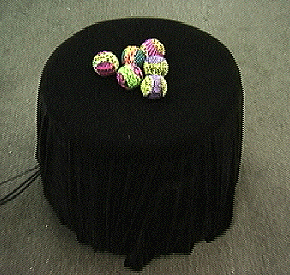 The Squeezable Jello Ball Table |
The table is actually an inverted half whisky barrel. It is decorated
by covering it with a black velveteen. This makes it look like a
magician's table too. Between the barrel top and the velveteen, a piece
of foam is fitted so that the table top will feel soft and comfortable.
The table is about 1.5 feet high and 21 inches across. Applications include sound sculpting (shaping sound by physically shaping objects), music algorithm manipulation, sequence maniplation and sound selection in realtime.
|
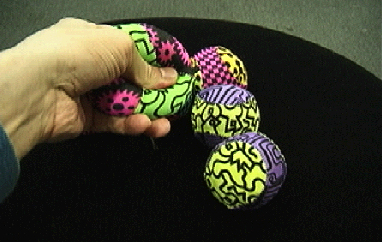 Squeezing the Jello Balls
|
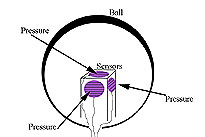 The Rectangular Sensor Block in the Squeezable |
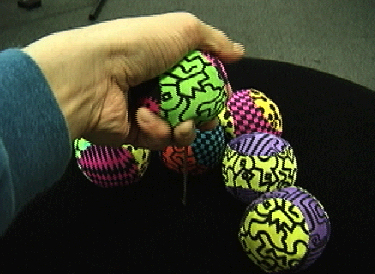 Lifting/pulling the retractable Jello Balls
|
The sensor that measures the squeezing is made out of five
force sensing resistors, glued onto and around one side of the
rectangular nylon block as shown in the picture above.
This sensor block is then pushed into
the center of the jello ball and the ball is sealed by thread. The wires that connect to the sensor block in the ball then go through a little hole on the table and tied at the other end to a variable resistor slider. The slider is hidden under the table. To make the squeezable balls retract back onto the table top, elastics are tied to the sliders. The slider measures the amount of pulling/lifting of the ball from the table top. Both the squeezing and pulling are sampled by the computer running Max. Max is a graphical object-oriented patch programming environment for MIDI. Mappings are then created with Max to interprete the values from the sensors into music and sound. The synthesizers used for generating the sound and music are the Nord Rack II (virtual analog), E-Mu Ultraproteus, Roland Sound Canvas SC55, Digidesign SampleCell II sampling synthesizer and Steinberg's REBIRTH, a fully software synthesis program that runs on an Apple Macintosh.
|
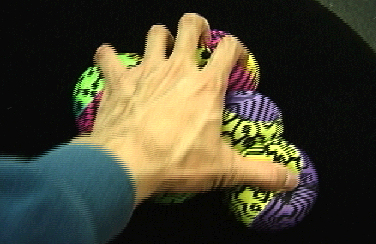 Squeezing the Jello Balls as a cluster
|
In order to retain the feature of the Squeezable Cluster (Version 3 Squeezables),
the squeezable jello balls are placed in the middle of the table instead of
around the perimeter of the table (Version 5). This way, all six balls
can be grouped together and squeezed like a cluster. The cluster feature is
unique because one has six continuous controls (instead of one) that allows
simultaneous changing of many sound and music parameters in a very
comfortable and organic way. At the same time, the cluster can be separated making it possible for more than one person to play with the squeezables. This will encourage group play of the same instrument, something that is rare.
|
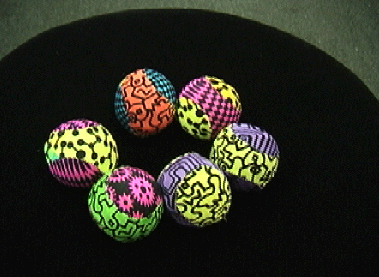 Arranging the Squeezable into a different shape/pattern
|
Having the squeezables separated gives another advantage.
They can be arranged into many different shapes and clusters which
gives the collective squeezable symmetrical, non-symmetrical or
irregular shapes. This gives the player a freedom to "shape" their instrument
according to what they feel comfortable before playing.
|
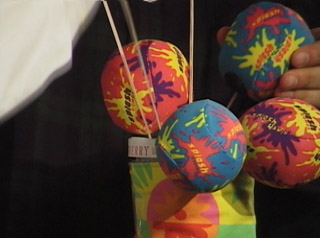
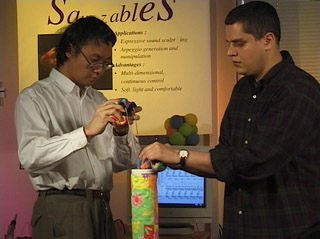
It has been observed that children with small hands and fingers like to squeeze or pinch one ball of the Squeezable cluster instead of the whole cluster. They also like to play in groups and interact with one another.
The SQUeeZABLE Pole evolved from the Squeezable Cluster to allow each ball to be squeezed separately. This is the important feature that allows group play, i.e. more than one person to squeeze and pull. All seven Squeezables are at the top of a pole-like station. When pulled and let go, the squeezables will return to the pole by themselves. The squeezing and stretching are mapped to play the Nord Rack II and E-Mu ultraproteus synthesizers through algorithms like the Arpeggio engine. Sound sculpting algorithms are used to shape sound by shaping the squeezables.
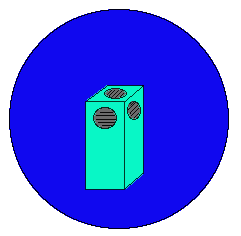
The Sensor Block
The Sensor Block, which is in the heart of the every squeezable ball, simulates the shape of a baloon bulb detecting pressures from all sides of the squeezable ball. The Pull Barrel, tied to the wire of all the squeezables, converts all the pulling to pushing the FSRs under it.
All these FSRs are connected to the ICube digitizer which measures voltage drop across a bridge. The ICube is connected to the Apple Macintosh running Max. Max is an object oriented graphical programming tool. The values are interpreted and processed by algorithms in Max which then controls all the synthesizers, like the Nord Rack II, E-Mu UltraProteus and Roland Sound Canvas.
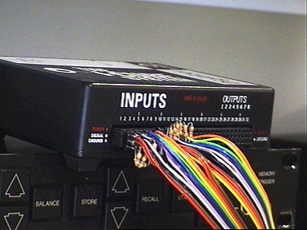
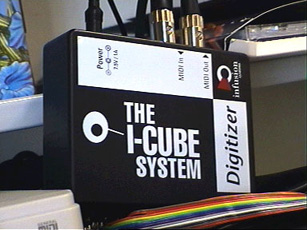
The ICube Digitizer : A MIDI based Digitizer
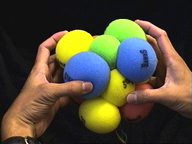

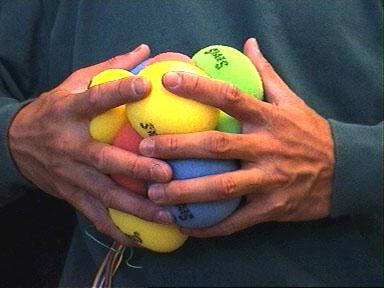
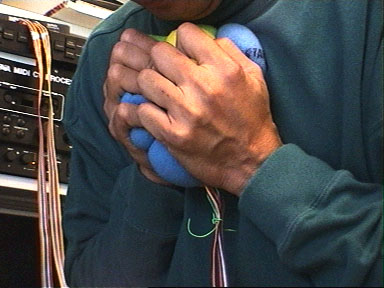
Eeeeee........
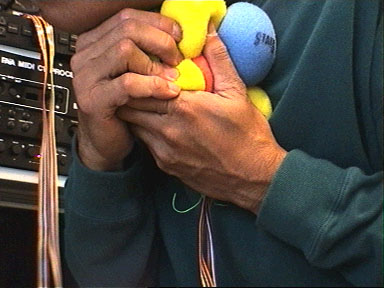
Ahhhhh..... !!
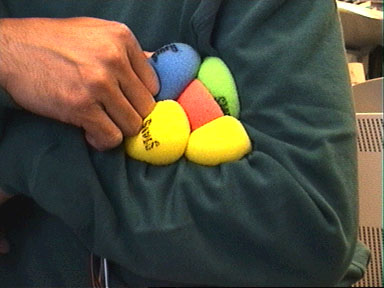
Errrrr..... !
Since all the foam balls are glued to one another, squeezing or touching anyone of them will apply pressure to the different sides of the sensor cube in a different way. For the ball that is directly above the cube, squeezing it will apply more pressure to that face of the cube and depending on the squeezing action, will apply pressure to the other face of the cube. If the foam ball that is not directly on the cube is squeezed, pressure will be applied onto the faces that are near that ball.
In summary, the sensor cube will tell us where and what is squeezed and how.
There are also FSRs between foam balls to capture extra squeezing pressures around the cluster.
The FSRs are connected to the ICube digitizer which measures voltage drop across a bridge. The ICube is connected to the Apple Macintosh running Max. Max is an object oriented graphical programming tool. The values are interpreted in Max and used to control a MIDI synthesizer.


The ICube Digitizer : A MIDI based Digitizer
For sound sculpturing, a Nord Rack 2 virtual analog synthesizer is used. The values are used to change the various oscillator and filter values to achieve the sculpturing. The harder you squeeze, the more "distress" is the Nord Rack 2.
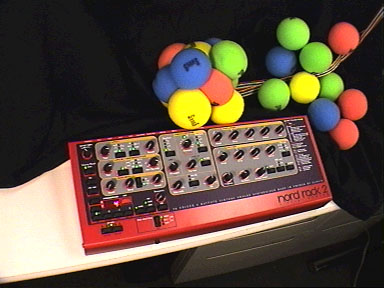
The Nord Rack 2 Virtual Analog Synthesizer
For the instrument control of a piece of music, Max is used to playback a MIDI piece to a Korg General MIDI synthesizer. The SQUeeZABLE will control the program changes, number of tracks to play/mute and volume of tracks through Max.
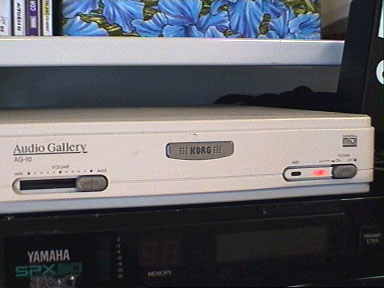
The Korg AG-10 General MIDI Synthesizer
